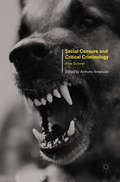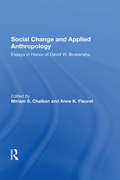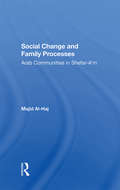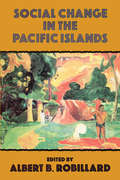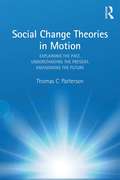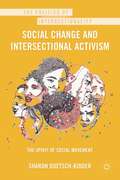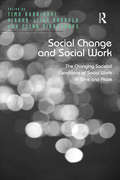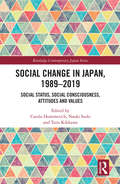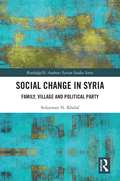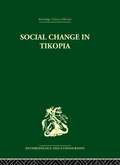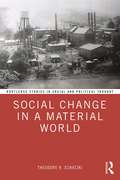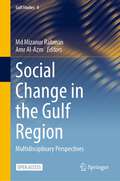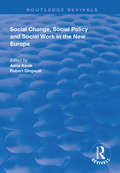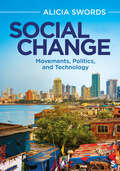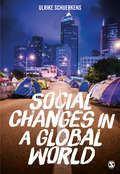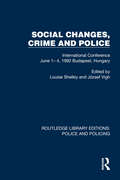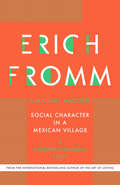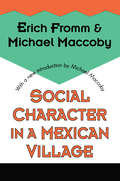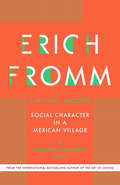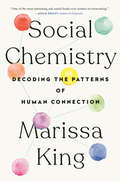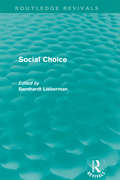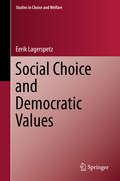- Table View
- List View
Social Censure and Critical Criminology: After Sumner
by Anthony AmatrudoThis edited collection focuses on the sociology of 'social censure' – the sociological term advocated by Colin Sumner in his seminal writing of the 1980s and 1990s. Social censure has become increasingly important in contemporary criminological writing. This can especially be seen in recent writing on gender and race and also in terms of the way that the state's relationship to crime is now understood. This collection addresses a deficit in the published literature and both revisits themes from an earlier era and looks forward to the development of new writing that develops Sumner’s seminal work on social censure. The contributors are drawn from leading scholars from across the Social Sciences and Law and they address a wide range of issues such as: race, youth justice, policing, welfare, and violence. The resulting volume is an interdisciplinary text which will be of special interest to scholars and students of Critical Criminology and Socio-Legal Studies, as well as those interested in the operation of the criminal justice system and criminological theory.
Social Change And Applied Anthropology: Essays In Honor Of David W. Brokensha
by Miriam Chaiken Anne K. FleuretThis collection of essays in the honor of David Brokensha focuses on issues which had concerned him throughout his professional career as an anthropologist. He emphasized on combining indigenous perspectives and knowledge in development planning and on sustainable natural resource management.
Social Change And Family Processes: Arab Communities In Shefar-a'm
by Majid Al-hajIn this book, Majid Al-Haj analyzes the structure of family kinship groups, the role of women, and fertility among several Arab subcommunities in Israel. He combines historical materials, anthropological evidence, and several major surveys in tracing family and demographic patterns in a developing Arab community. This study is the first to compare Moslems, Christians, and Druze over time in the same community and to integrate issues of modernization and population for minorities. Particular attention is given to the analysis of "internal refugees" among Moslems, the separation of structural from cultural determinants of family patterns, and the distinction between behavior and norms associated with family lifestyles. This volume represents a fascinating case study of an Arab town in the transition to modernity under the conditions of changing layers of minority status in Israeli society. Moreover, the author addresses broader issues of modernization and demographic change characterizing the Middle East and other developing areas of the world where minority ethnic conflict and population processes are intertwined.
Social Change In The Pacific Islands
by RobillardFirst published in 1992. The Pacific Ocean is the largest geographical feature on the face of the earth, covering about one third of its entire surface. Occupying part of that large expanse are the far-flung islands of the Pacific. As the papers of this volume clearly indicate, the post-world war II era and decolonization have brought unprecedented change, and the Pacific is now experiencing problems that were formerly associated with other Third World nations. Most Pacific countries have rapidly expanding populations, and over half of all Pacific Islanders are now in their teenage years or younger. Education and modern communications have served to increase aspirations and attracted by hopes of employment and the distractions of urban life, islanders are gravitating to urban centers.
Social Change Theories in Motion: Explaining the Past, Understanding the Present, Envisioning the Future
by Thomas C. PattersonThis book assesses how theorists explained processes of change set in motion by the rise of capitalism. It situates them in the milieu in which they wrote. They were never neutral observers standing outside the conditions they were trying to explain. Their arguments were responses to those circumstances and to the views of others commentators, living and dead. Some repeated earlier views; others built on those perspectives; a few changed the way we think. While surveying earlier writers, the author’s primary concerns are theorists who sought to explain industrialization, imperialism, and the consolidation of nation-states after 1840. Marx, Durkheim, and Weber still shape our understandings of the past, present, and future. Patterson focuses on explanations of the unsettled conditions that crystallized in the 1910s and still persist: the rise of socialist states, anti-colonial movements, prolonged economic crises, and almost continuous war. After 1945, theorists in capitalist countries, influenced by Cold War politics, saw social change in terms of economic growth, progress, and modernization; their contemporaries elsewhere wrote about underdevelopment, dependency, or uneven development. In the 1980s, theorists of postmodernity, neoliberalism, globalization, innovations in communications technologies, and post-socialism argued that they rendered earlier accounts insufficient. Others saw them as manifestations of a new imperialism, capitalist accumulation on a global scale, environmental crises, and nationalist populism.
Social Change and Intersectional Activism
by Sharon Doetsch-KidderReading texts in relation to feminist, queer, and race theory and Buddhist philosophy, this book argues that an understanding of spirit is critical to explaining the power that social movements have to change hearts, minds, and social structures.
Social Change and Social Work: The Changing Societal Conditions of Social Work in Time and Place
by Timo Harrikari Pirkko-Liisa RauhalaSocial Change and Social Work discusses and examines how social work is challenged by social, political and economic tendencies going on in current societies. The authors ask how social work as a discipline and practice is encountering global and local transformations. Divided into three parts, topics covered include the changing social work mandate throughout history; social work paradigms and theoretical considerations; phenomenological social work; practice research; and gender and generational research. Taken together, the chapters in this anthology provide an authoritative and up-to-date overview of current discussions within the European social work research community.
Social Change in Japan, 1989-2019: Social Status, Social Consciousness, Attitudes and Values (Routledge Contemporary Japan Series)
by Carola Hommerich Naoki Sudo Toru KikkawaBased on extensive survey data, this book examines how the population of Japan has experienced and processed three decades of rapid social change from the highly egalitarian high growth economy of the 1980s to the economically stagnating and demographically shrinking gap society of the 2010s. It discusses social attitudes and values towards, for example, work, gender roles, family, welfare and politics, highlighting certain subgroups which have been particularly affected by societal changes. It explores social consciousness and concludes that although many Japanese people identify as middle class, their reasons for doing so have changed over time, with the result that the optimistic view prevailing in the 1980s, confident of upward mobility, has been replaced by people having a much more realistic view of their social status.
Social Change in Modern Africa: Studies Presented and Discussed at the First International African Seminar, Makerere College, Kampala, January 1959
by Aidan SouthallOriginally published in 1961, this book analyses economic changes in Africa and the restructuring of social relations to which this hs led. there are also detailed studies of the character of social changes in individual communities. There is a particular focus on changing kinship status and neighbourhood as the impact of modern economic conditions is felt in Tropical Africa.
Social Change in Syria: Family, Village and Political Party (Routledge/ St. Andrews Syrian Studies Series)
by Sulayman N. KhalafStudying a rural village in northern Syria during a period of tremendous social and political change (1940s to 1970s), this book offers a unique perspective on how agrarian transformations in land distribution and its use deeply affected social and political relations among a rural community. Embedding the personal with the local and the global, this work traces the seeds of social, political and economic struggles that are still important and unfolding in Syria forty years on: changes in social relations brought about by land policy and technological modernization, divisions and connections between urban and rural locations, shifts in education and immigration. Thematically, the study is divided into two parts: the first concerns the historical, socio-economic and political changes occurring in Syria from the beginning of the twentieth century, and the second concerns the life histories of particular actors and their perspectives on social changes. This book is the edited and updated version of Khalaf’s original work, including an ‘updating chapter’ which brings invaluable insight about the village and its people at the aftermath of ISIS and the destruction of the war in Syria. Focusing on the village community of Hawi Al-Hawa, this intensely knowledgeable and personal account — a rare combination — brings village life in Syria strikingly close. The volume is an important contribution to the fields of anthropology, social sciences, Syrian and Middle East studies.
Social Change in Tikopia: Re-study of a Polynesian community after a generation
by Raymond FirthRe-visiting Tikopia a decade after his first visit, Raymond Firth here examines what impact the forces of modernization had on Tikopia society with regard to economics, law, politics and social affairs. Suffering a famine whilst there, the author also examined the issues of responsibility for the famine; problems of distribution in ceremonial and ritual; institutional developments from the famine. Originally published in 1959.
Social Change in a Material World: How Activity and Material Processes Dynamize Practices (Routledge Studies in Social and Political Thought)
by Theodore R. SchatzkiSocial Change in a Material World offers a new, practice theoretical account of social change and its explanation. Extending the author’s earlier account of social life, and drawing on general ideas about events, processes, and change, the book conceptualizes social changes as configurations of significant differences in bundles of practices and material arrangements. Illustrated with examples from the history of bourbon distillation and the formation and evolution of digitally-mediated associations in contemporary life, the book argues that chains of activity combine with material events and processes to cause social changes. The book thereby stresses the significance of the material dimension of society for the constitution, determination, and explanation of social phenomena, as well as the types of space needed to understand them. The book also challenges the explanatory significance of such key phenomena as power, dependence, relations, mechanisms, and individual behavior. As such, it will appeal to sociologists, geographers, organization studies scholars, and others interested in social life and social change.
Social Change in the Gulf Region: Multidisciplinary Perspectives (Gulf Studies #8)
by Md Mizanur Rahman Amr Al-AzmThis open access book, comprising thirty-nine chapters divided into social, cultural, economic, and political spheres, offers a unique opportunity to dive into the complex, dynamic, and sometimes contradictory transformation of Gulf societies in the last few decades. Whilst the Gulf region has at times been seen as impervious to this natural phenomenon of transformation—timeless, never changing, deeply rooted in its ancient tribal customs and traditions and able to blend past and present seamlessly without suffering the wrenching trauma of change—this is clearly not the case, and the region is not immune to the inevitable forces of social change. There is no doubt today that the social change sweeping the Gulf has been profound, affecting almost every aspect of life in the Gulf societies. This volume has an encyclopedic value as the chapters collectively offer multifaceted and multidisciplinary perspectives to understand social change in the Gulf region. Through these chapters, the role of economic and educational transformation, and the impact of social media, migration, and urbanization have in driving social change in the Gulf societies is examined in detail with a focus on their directions, magnitudes, and relevant policy options. It also considers how COVID-19 is affecting the lives of the people in the Gulf. This book bridges gaps in the understanding of the rapid pace of social change in the Gulf, offering practical solutions for policy interventions. It is of interest to scholars and students in Middle Eastern studies, specifically, as well as sociology, media studies, migration studies, and educational policy.
Social Change, Social Policy and Social Work in the New Europe (Routledge Revivals)
by Robert Dingwall Anna KwakFirst published in 1998, this edited volume reflected on the role of universities and aimed to improve the preparation of social welfare professionals by the University of Warsaw for employment in the new market-oriented society that was being created in Poland after the end of ‘real socialism’ in 1989. Many of its articles were previously published in Polish and were published, revised and updated, in English for the first time in this collection. The contributors discuss two key issues. First, should universities worry about the employment of their graduates and the skills that are needed by the wider economy and society or just focus on transmitting advanced learning? Second, they considered the modernisation of the welfare state. The Polish experience, and the Western partners’ reaction to it, has proved an excellent case study for these issues.
Social Change: Movements, Politics, and Technology
by Alicia SwordsSocial Change: Movements, Politics, and Technology is a groundbreaking exploration of social transformation from a conflict theory perspective, offering a deep dive into the historical and sociological analysis of leaders within contemporary social movements. This text-reader is an essential guide for those seeking to understand the dynamics of social change and the role of social actors in shaping the future.
Social Change: Movements, Politics, and Technology
by Alicia SwordsSocial Change: Movements, Politics, and Technology is a groundbreaking exploration of social transformation from a conflict theory perspective, offering a deep dive into the historical and sociological analysis of leaders within contemporary social movements. This text-reader is an essential guide for those seeking to understand the dynamics of social change and the role of social actors in shaping the future.
Social Changes in a Global World
by Ulrike SchuerkensRenowned author Ulrike Schuerkens presents an in-depth exploration of social transformations and developments. Combining an international approach with up-to-date research, the book: Has dedicated chapters on contemporary topics including technology, new media, war and terror, political culture and inequality Includes an analysis of societal structures – inequality, globalization, transnationalism Contains learning features including: discussion questions, annotated further reading, chapter summaries and pointers to online resources to assist with study A must buy for students taking modules in social change, social inequality, social theory and globalization.
Social Changes, Crime and Police: International Conference June 1– 4, 1992 Budapest, Hungary (Routledge Library Editions: Police and Policing)
by Louise ShelleyOriginally published in 1995, Social Changes, Crime and the Police studies the relationship of social change and crime, the role of the police amidst changing social conditions, and the reaction of society and the state to the criminal problem. It examines the essential differences and challenges which confronted countries in Western and Eastern Europe after the collapse of the socialist system. In recent years, many areas of Europe had experienced a period of rapid technological development which had changed economic and cultural structures, creating temporary instability. Within a relatively short period of time traditional values and beliefs had been undermined. National boundaries and geographical differences had gradually lost their significance and the opening of frontiers had created easier conditions for crime. The nature of crime itself had been transformed by the increasingly close relationships between countries. While many Eastern European countries sought to undo the authoritarian legacies of the socialist period, Western Europe faced new challenges to its urban order. The editors and the contributors also examine the kinds of new policing concepts which may be formulated and the new practices which may develop during the next few decades. Governments must determine the role of the police and the law in accordance with public demands for powerful policing combined with consideration of the individual’s rights, thus maintaining the vital balance between personal freedom and social peace.
Social Character in a Mexican Village
by Erich Fromm Michael MaccobyThe renowned psychoanalyst Erich Fromm not only analyzed society and societal processes. Together with Michael Maccoby he did a study of Mexican peasants to empirically illustrate how historical, economic and social requirements determine behavior. Social Character in a Mexican Village does much more than introduce a new approach to the analysis of social phenomena. It throws new light on one of the world's most pressing problems, the impact of the industrialized world on the traditional character of peasants. Unanimously the book is an outstanding introduction to Fromm's concept of social character.
Social Character in a Mexican Village: A Sociopsychoanalytic Study
by Erich Fromm Michael MaccobyAfter the completion of the revolution in 1920, Mexico quickly became an increasingly industrialized country. The vast changes that occurred in the first fifty years after the revolution inspired Erich Fromm and Michael Maccoby to find out how the Mexican people were adapting. The result, Social Character in a Mexican Village, provides a new approach to the analysis of social phenomena.The authors applied Fromm's theories of psychoanalysis to the study of groups. They devised an ingenious method of questionnaires, which, combined with direct observation, clearly revealed the psychic forces that motivated the peasant population. In his new introduction, Michael Maccoby thoroughly explains the basis of the study, how it originated, and how it was carried out. He goes on to delineate the results and determine their impact on the present day. Social Character in a Mexican Village throws new light on one of the world's most pressing problems, the impact of the industrialized world on the traditional character of the peasant. This ground-breaking work will be invaluable to the work of sociologists, anthropologists, and psychoanalysts.
Social Character in a Mexican Village: A Sociopsychoanalytic Study
by Erich Fromm&“[A] groundbreaking study combining psychoanalytical and anthropological methods to analyse the impact of industrialization on &‘peasants.&’&” —Booknews The renowned psychoanalyst Erich Fromm analyzed more than just general society and societal processes. Together with Michael Maccoby, he completed a study of Mexican villagers to empirically illustrate how historical, economic, and social requirements determine behavior.Social Character in a Mexican Village does much more than introduce a new approach to the analysis of social phenomena. It throws new light on one of the world&’s most pressing problems, the impact of the industrialized world on the traditional character of the laboring class. Unanimously, the book is an outstanding introduction to Fromm&’s concept of social character. &“Fromm and Maccoby have written a study of crucial importance.&” —Richard J. Barnet, Institute for Policy Studies
Social Chemistry: Decoding the Patterns of Human Connection
by Marissa KingNext Big Idea Club Nominee Fall 2020Social Chemistry will utterly transform the way you think about &“networking.&” Understanding the contours of your social network can dramatically enhance personal relationships, work life, and even your global impact. Are you an Expansionist, a Broker, or a Convener? The answer matters more than you think. . . . Yale professor Marissa King shows how anyone can build more meaningful and productive relationships based on insights from neuroscience, psychology, and network analytics. Conventional wisdom says it's the size of your network that matters, but social science research has proven there is more to it. King explains that the quality and structure of our relationships has the greatest impact on our personal and professional lives. As she shows, there are three basic types of networks, so readers can see the role they are already playing: Expansionist, Broker, or Convener. This network decoder enables readers to own their network style and modify it for better alignment with their life plans and values. High-quality connections in your social network strongly predict cognitive functioning, emotional resilience, and satisfaction at work. A well-structured network is likely to boost the quality of your ideas, as well as your pay. Beyond the office, social connections are the lifeblood of our health and happiness. The compiled results from dozens of previous studies found that our social relationships have an effect on our likelihood of dying prematurely—equivalent to obesity or smoking. Rich stories of Expansionists like Vernon Jordan, Brokers like Yo-Yo Ma, and Conveners like Anna Wintour, as well as personal experiences from King's own world of connections, inform this warm, engaging, revelatory investigation into some of the most consequential decisions we can make about the trajectory of our lives.
Social Choice (Routledge Revivals #Vol. 1)
by Bernhardt LiebermannFirst published in 1971, Social Choice is both a text and reference containing the proceedings of a conference dealing with contemporary work on the normative and descriptive aspects of the social choice problem. This reissue will be of interest to advanced undergraduate and graduate courses on group decision making and social choice. Economists, social psychologists, political scientists and sociologists will welcome this valuable work.
Social Choice and Democratic Values
by Eerik LagerspetzThis book offers a comprehensive overview and critique of the most important political and philosophical interpretations of the basic results of social choice, assessing their plausibility and seeking to identify the links between the theory of social choice and the more traditional issues of political theory and philosophy. In this regard, the author eschews a strong methodological commitment or technical formalism; the approach is instead based on the presentation of political facts and illustrated via numerous real-life examples. This allows the reader to get acquainted with the philosophical and political dispute surrounding voting and collective decision-making and its links to social choice theory.
Social Choice and Legitimacy
by John W. Patty Elizabeth Maggie PennGoverning requires choices, and hence trade-offs between conflicting goals or criteria. This book asserts that legitimate governance requires explanations for such trade-offs and then demonstrates that such explanations can always be found, though not for every possible choice. In so doing, John W. Patty and Elizabeth Maggie Penn use the tools of social choice theory to provide a new and discriminating theory of legitimacy. In contrast with both earlier critics and defenders of social choice theory, Patty and Penn argue that the classic impossibility theorems of Arrow, Gibbard, and Satterthwaite are inescapably relevant to, and indeed justify, democratic institutions. Specifically, these institutions exist to do more than simply make policy - through their procedures and proceedings, these institutions make sense of the trade-offs required when controversial policy decisions must be made.
